Uncovering Energy Wasters: Spotting & Eliminating Common Home Energy Hogs
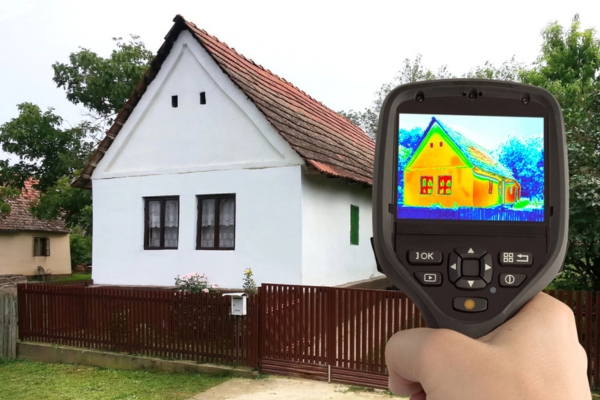
Energy efficiency in residences is essential for environmental protection and reducing household expenses. With climbing energy prices and the undeniable effects of climate change, it’s increasingly vital to minimize energy inefficiencies. The term “hidden energy hogs” captures those typically unnoticed areas in homes that can lead to high utility costs and elevated energy usage. Understanding how to conserve energy at home is crucial in effectively addressing these hidden energy drains.
This article by Point Bay Fuel can assist homeowners in pinpointing and addressing these prevalent energy drains, including antiquated HVAC systems, poorly insulated windows and doors, and other commonly disregarded spots, promoting more sustainable and energy-efficient homes.
Outdated Heating & Cooling Systems
Contents
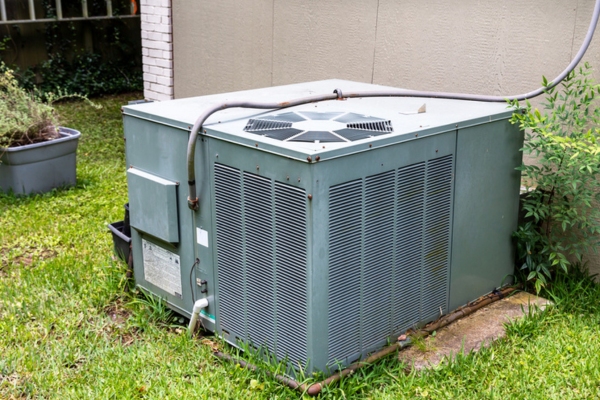
Inefficient heating and cooling systems are significant culprits in residential energy waste, primarily due to their inability to effectively manage indoor climates. Indicators that your HVAC system may need to be updated include regular malfunctions, inconsistent temperature control across different house areas, and persistently high utility bills.
Transitioning to more energy-efficient HVAC models, especially those recognized with Energy Star certifications, not only enhances indoor comfort but also lowers energy expenses, minimizes environmental footprint, and provides various additional advantages.
When selecting a new HVAC system, homeowners should evaluate the unit’s efficiency rating, ensure it is correctly sized for their living space, and secure professional installation to guarantee maximum performance and energy conservation. Ongoing maintenance is also essential as it helps maintain the system’s efficiency and extends its operational life.
Don’t let inefficient HVAC systems deplete your finances. Contact Point Bay Fuel for expert heating and cooling upgrades and maintenance services today!
Inefficient Windows & Doors
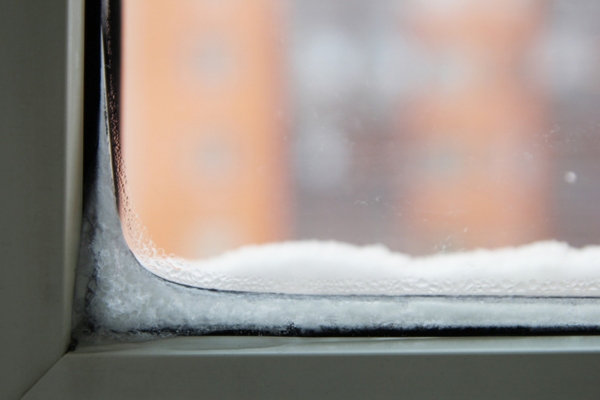
Windows and doors significantly contribute to home energy inefficiency, primarily through air leaks and subpar insulation. Older windows and doors, particularly those equipped with single-pane glass or insufficient weather stripping, exacerbate energy waste. They let conditioned air escape and unconditioned air infiltrate, forcing the HVAC system to exert extra effort to stabilize indoor temperatures. This additional strain leads to heightened energy use and escalated utility costs.
Upgrading to energy-efficient doors and windows with double or triple-pane glass, low-emissivity (low-E) coatings, and robust sealing can significantly diminish energy loss. These enhancements bolster comfort by stabilizing indoor temperatures, reducing energy bills, and elevating your home’s overall energy efficiency.
Phantom Energy Drain
Phantom energy drain, or standby power, is the energy used by appliances and electronics, even when turned off or in standby mode. This commonly underestimated source of energy waste can considerably affect energy bills, constituting as much as 10% of a household’s energy consumption. Understanding how to conserve energy at home can help mitigate this issue effectively.
Devices that remain plugged in are common culprits of phantom energy usage. Homeowners can curb this type of energy loss by utilizing power strips, which allow for the simultaneous disconnection of multiple devices. Additionally, unplugging electronics when not in use and choosing energy-efficient appliances with low standby power needs can significantly reduce phantom energy consumption.
Furthermore, smart plugs and energy monitors are efficient tools for controlling and minimizing phantom energy usage by providing enhanced energy consumption management and oversight.
Inadequate Insulation
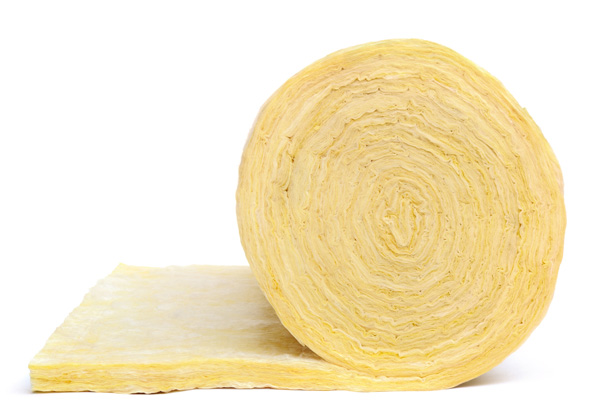
Effective insulation is essential for minimizing energy waste and sustaining indoor comfort by blocking heat loss during the colder season and heat gain in warmer months. Insufficient insulation in critical locations such as attics, walls, and floors can result in substantial energy inefficiencies, compelling heating and cooling systems to overwork and driving up energy costs.
Enhancing or installing new insulation in these critical areas can dramatically boost a home’s energy efficiency. Options like fiberglass, cellulose, and spray foam provide diverse advantages and can be applied using methods such as batts, blown-in, or spray techniques tailored to the home’s specific requirements and structural characteristics.
Stop your home’s energy waste today! Arrange a thorough HVAC inspection with Point Bay Fuel to pinpoint and resolve efficiency issues. Call now to secure your appointment!
Inefficient Lighting Solutions
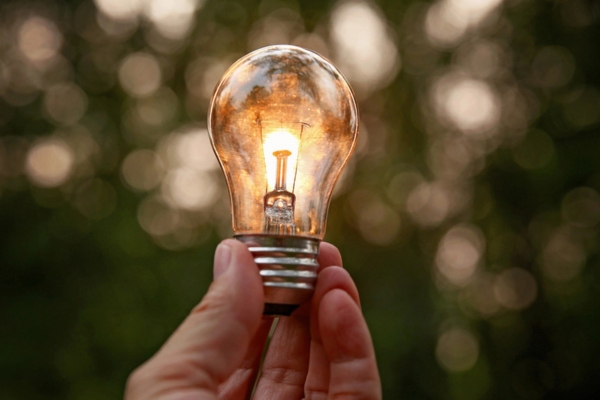
Adopting energy-efficient lighting options, like LED bulbs, provides substantial benefits in energy conservation. They use less energy and are more durable than traditional incandescent and fluorescent bulbs. These older bulb types use more electricity and have shorter lifespans, resulting in increased energy expenditures and more frequent replacements.
To optimize energy efficiency, homeowners are advised to choose LED bulbs that provide the proper brightness and color temperature for each room. Features such as a dimmable capacity should also be considered. The installation process for energy-efficient lighting is simple and typically involves swapping out existing bulbs for LEDs or upgrading fixtures to support this newer technology.
Additional Sources of Energy Waste
Several less obvious but prevalent sources of energy waste can notably affect a home’s efficiency and utility expenses.
Inefficient Home Appliances
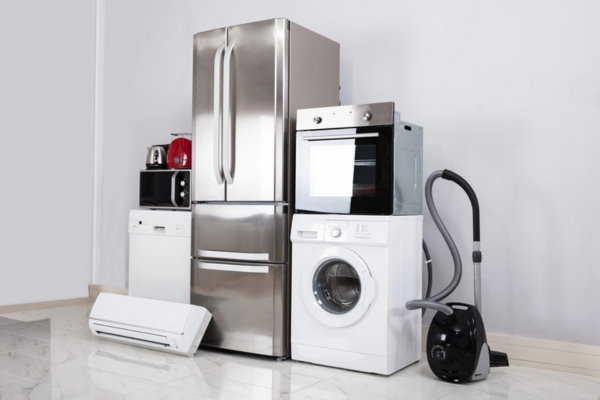
Old appliances are typically significant energy consumers, using much more electricity than modern, energy-efficient models. Appliances like refrigerators, washing machines, and dishwashers that are over ten years old generally need to meet the efficiency standards of today’s models. Replacing them with ENERGY STAR-certified appliances can cut energy usage by up to 50%, yielding considerable reductions in utility bills and lessening environmental impact.
Neglected HVAC System Maintenance
Consistent maintenance is crucial for maximizing the efficiency of HVAC systems and minimizing energy wastage. Overlooking essential maintenance tasks such as replacing air filters, cleaning coils, and checking ductwork can cause a drop in performance and increase energy use. Arranging yearly professional inspections and conducting regular maintenance ensures the system operates effectively, extends its operational life, and helps control energy expenses.
Water Heater
Optimizing the efficiency of water heaters is critical to decreasing energy waste. Insulating the water heater tank and its adjacent piping can reduce heat loss, helping the system maintain the required temperature using less energy.
Setting the thermostat to 120°F can also help avoid overheating and conserve energy. For further efficiency improvements, homeowners might consider switching to tankless or high-efficiency water heater models.
Optimal Thermostat Settings
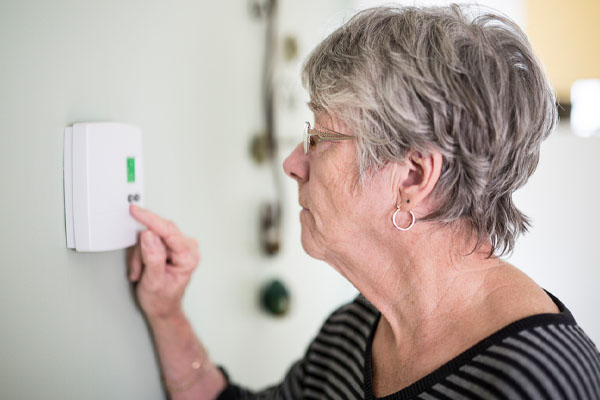
Correct thermostat management is vital for maximizing energy efficiency. Adjusting thermostats to energy-efficient settings—68°F in the winter and 78°F in the summer—can considerably lower energy use. Employing programmable or smart thermostats enables homeowners to automate temperature adjustments per their routines, promoting efficient energy use while maintaining comfort. These devices can also adapt to household habits and optimize energy savings through smart adjustments.
In need of HVAC repairs? Point Bay Fuel provides reliable HVAC services to ensure your home remains comfortable throughout the year. Call us now!
How to Conserve Energy at Home
Energy conservation is key to lowering utility bills and reducing environmental impact. Homeowners can adopt effective strategies to improve comfort, save money, and support sustainability.
- Heating and Cooling: Maintaining efficient heating and cooling is crucial for conserving energy. Keeping thermostats set to 68°F during the winter and 78°F in the summer helps reduce energy consumption. Programmable thermostats enhance this efficiency by automatically adjusting temperatures according to daily schedules. Regular HVAC maintenance with Point Bay Fuel ensures optimal system performance and minimal energy wastage.
- Appliances and Electronics: Disconnecting electronics when not in use and utilizing power strips can significantly decrease energy waste. Investing in ENERGY STAR-certified appliances can lead to significant savings, as these devices use up to 50% less energy than conventional models.
- Lighting: Transitioning to LED bulbs is a potent energy-saving strategy, as they consume less power and last longer than traditional bulbs. Making the most of natural light and ensuring lights are turned off when not necessary also helps minimize energy use.
- Water Usage: Saving water also conserves the energy required to heat it. Installing low-flow fixtures, repairing leaks, and adopting water-efficient habits like taking shorter showers and only running full loads in washing machines and dishwashers significantly reduce consumption.
Additional energy savings can be realized through home insulation, installing energy-efficient doors and windows, and sealing air leaks. Utility companies and government agencies often offer incentives and rebates for making energy-efficient upgrades. Leveraging these programs can help cover the costs of upgrades and facilitate long-term savings.
Conclusion
Addressing and mitigating common energy wasters in the home, including outdated HVAC systems, inefficient windows and doors, poor insulation, phantom energy usage, and suboptimal lighting, can significantly diminish the environmental impact and energy costs. Learning how to conserve energy at home is critical to tackling these issues effectively.
Essential steps include prioritizing energy efficiency with consistent maintenance, investing in energy-efficient appliances and fixtures, and cultivating energy-saving practices. Homeowners are urged to actively improve their homes’ energy efficiency, which benefits their finances and the environment.
Contact Point Bay Fuel for Premier Home Comfort Solutions
Look to Point Bay Fuel for unmatched heating and cooling services in Ocean County and Monmouth County, New Jersey. Our team of professionally certified professionals specializes in a range of HVAC solutions, from regular maintenance and repairs to complete installations and upgrades. We’re dedicated to providing the highest care for your HVAC system.
Point Bay Fuel offers top-quality, affordable heating and cooling services to enhance your comfort and system’s efficiency, reducing energy bills. Whether you need repairs or a system replacement, we offer cost-effective solutions customized to your needs, ensuring complete satisfaction. Reach out to Point Bay Fuel today to get a free in-home estimate or schedule a service appointment.
Contact us now by calling (732) 349-5059 to speak to one of our home comfort specialists! Click the link to view our service area.

Related Articles:
- Seasonal Energy Savings: How To Optimize Your Home’s Efficiency All Year Round
- What Is a Seasonal Energy Efficiency Rating?
- Mastering The Right Ceiling Fan Direction Can Lead To Year-Round Energy Savings
- Uncovering Hidden Drafts: Tips To Detect Air Leaks in Your Home
- 12 Smart Tips To Improve The Efficiency Of Your Air Conditioner
